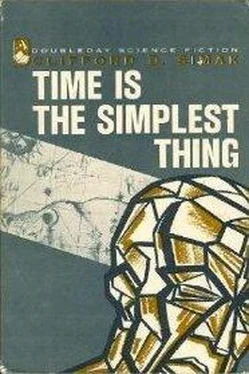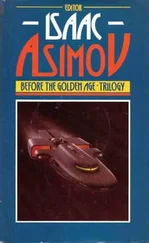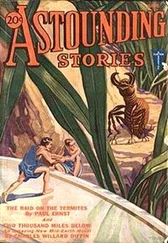“You buy the loyalty,” said Blaine. “There is no one of us who ever claimed he was underpaid.”
“That,” Rand told him, “is not what I am talking about and you know it isn’t.”
And you, Blaine asked inaudibly — what are the qualifications for security? Peeping could be one of them — the ability to look into another’s mind — but there’d never been any evidence in all the years he had known Rand that the man actually was a peeper. If he were a peeper, then why should he use men in his department whose sole purpose consisted of their ability to peep?
“I can’t see what all this has to do,” said Blaine, “with not giving us some time control. We could—”
“And I don’t see why you should fret yourself,” Rand countered. “You’ll be going back to your precious planet. You can pick up where you left off.”
“Of course, I’m going back. I found it, didn’t I? That sort of makes it mine.”
He finished off the drink, put the glass down on the desk.
“Well, I’m off,” he said. “Thank you for the drink.”
“Of course,” said Rand. “Wouldn’t think of keeping you. You’ll be back tomorrow?”
“Nine o’clock,” said Blaine.
Blaine walked through the massive, ornate entrance that fronted on the plaza and under ordinary circumstance he would have stopped there for a moment to soak in this best part of the day. The street lamps were soft blobs of light, and the fronds were rustling in the evening breeze. The strollers on the walks seemed disembodied shadows, and the cars went sliding past in a sort of breathless haste, but quietly, very quietly. And over all of it hung the magic haze of an autumn night.
Tonight he did not stop. There was no time to stop.
Eight minutes now. Eight little lousy minutes.
Five blocks to get his car out of the parking lot and he didn’t have the time. He couldn’t take the chance. He had to leave the car.
And there was something else — there was Kirby Rand. Why, on this of all nights, had Rand popped out his door and asked him in to have a drink?
There was nothing that he could put his finger on, but he felt a vague disquiet at his talk with Rand. It was almost as if the man had known he was stealing time from him, as if he might have sensed that there was something wrong.
But all of that was past, Blaine told himself. It had been hard luck, of course, but it was not disastrous. In fact, there might even be some advantage to it. If he had got his car, Fishhook would have known exactly where to look for him. But forced to stay within the city, he could vanish in a matter of ten minutes.
He strode swiftly down the walk and turned in a direction away from the parking lot.
Give me ten minutes more, he told himself, almost as if it were a prayer. With a ten-minute start, there were a dozen places he could hide himself — hide himself to gain a little breathing space, to do a little thinking and to make some plans. For now, without a car, he simply had no plans.
He’d get those ten minutes, he was sure, if he only could be so lucky as to meet no one who might recognize him.
He felt the terror welling up as he strode along, a terror rising like a froth foaming in his skull. And it was not his terror; it was not human terror. It was abysmal and black, a screaming, clawing terror that had its origin in a mind that could hide no longer from the horrors of an alien planet, that could no longer huddle inside an alien brain, that finally found it unbearable to face up to a frightening situation that was made almost unendurable by a total lack of background.
Blaine fought against the terror, teeth gritted in his mind, knowing with one thin, undulled edge of understanding that it was not himself who had tripped the terror, but this other, this lurker in the brain.
And realized, even as he thought it, that he could scarcely separate the two of them — that they were bound inexorably together, that they shared a common fate.
He started to run but forced himself to stop with the last ounce of resolution in him. For he must not run; he must in no wise attract attention to himself.
He lurched off the walk and collided with the trunk of a massive tree, and his hands went out to grasp and hug it, as if by the mere act of contact with something earthly he might gain some strength.
He stood there against the tree, hanging on as best he could — and hanging on was all. Slowly the terror began to drain back into some inner recess of his skull, crawling back into its hole, hiding piteously again.
It’s all right, he told the thing. You stay right where you are. Don’t worry. Leave everything to me. I will handle this.
It had tried to get away. It had tried its best to burst free of where it was and, having failed, now was pulling back into the one safe corner of the pen in which it found itself.
No more of this, Blaine thought. I can’t afford another one like this. If another came, he knew, he could not stand against it. He could not keep himself from running from the terror, slobbering and screaming in horror as he ran. And that would be the end for him.
He let loose of the tree and stood stiff and straight beside it, forcing himself to stand stiff and straight against his weakness and his rubber legs. He felt the chill dampness of the perspiration which had started out on him and he was panting like a man who had run a race.
How could he run and hide, he asked himself; how could he get away with this monkey on his back? Himself alone was bad enough. He could not hope to do it if he had to drag along a frightened, whimpering alien.
But there was no way to lose the alien, no way he knew of at the moment to shake it loose of him. He was stuck with it and he must get along with it the best way that he could.
He moved out from the tree and went on down the walk, but more slowly and less surely, trying to still the shaking in him, trying to pump some strength into his wobbly legs. And through it all, he suddenly realized that he was ravenous with hunger. The wonder was, he told himself, that he had not sooner been aware of it, for except for the glass of milk, he had had no food for more than thirty hours. Rest — rest that had amounted to a deep, unbroken sleep — but not a bite of food.
The cars went sliding past, whispering on their airjets, with the soft, low murmur of the nuclear engines like an undertone.
One pulled to the curb just ahead of him, and a head stuck out.
“Shep,” said the head, “how lucky! I was hoping I would find you.”
Blaine stood in panic for an instant and he felt the alien terror rising once again, but he crammed it back into its corner with every shred of mental power he had.
He made his voice calm and fought to keep it even.
“Freddy,” he said. “It’s a long time since I’ve seen you.” For it was Freddy Bates, man of no apparent occupation, although it was vaguely understood that he represented someone or other in this place where almost every other person was a lobbyist or representative or petty diplomat or undercover agent.
Freddy opened the door.
“Hop in,” he said. “We’re going to a party.”
And this might be it, thought Blaine. This might be the way to start where he was going. It was better, certainly, than anything he had in mind. Fishhook would never in a million years think to find him at a party. And another thing: A party would be an easy place to slip away from. There would be so many people that none of them would notice when or where one of them might go. There would be, he was almost certain, at least one car with the key left carelessly in its ignition lock. There would be food — and he needed food.
“Come on,” said Freddy. “It is one of Charline’s parties.”
Читать дальше








